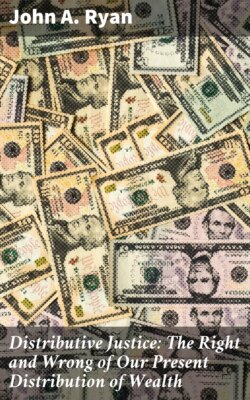Читать книгу Distributive Justice: The Right and Wrong of Our Present Distribution of Wealth - John A. Ryan - Страница 27
На сайте Литреса книга снята с продажи.
Three Principal Kinds of Natural Rights
ОглавлениеTable of Contents
Although natural rights are all equally valid, they differ in regard to their basis, and their urgency or importance. From this point of view, we may profitably distinguish three principal types.
The first is exemplified in the right to live. The object of this right, life itself, is intrinsically good, good for its own sake, an end in itself. It is the end to which even civil society is a means. Since life is good intrinsically, the right to life is also valid intrinsically, and not because of consequences. Since there is no conceivable equivalent for life in the case of any individual in any contingency, the right to life is immediate and direct in all possible circumstances.
Among the natural rights of the second class, the most prominent are the right to marry, to enjoy personal freedom, and to own consumption-goods, such as food and clothing. The objects of these rights are not ends in themselves, but means to human welfare. Confining our attention to marriage, we see that membership in the conjugal union is an indispensable means to reasonable life and self development in the majority of persons. The only conceivable substitutes are free love and celibacy. Of these the first is inadequate for any person, and the second is adequate only for a minority. Marriage is, therefore, directly and per se necessary for the majority of individuals; for the majority it is an individual necessity. If the State were to abolish marriage it would deprive the majority of an indispensable means of right and reasonable life. Consequently the majority have a direct natural right to the legal power of marrying.
In the case of the minority who do not need to marry, who can live as well or better as celibates, the legal opportunity of marriage is evidently not directly necessary. But it is necessary indirectly, inasmuch as the power of choice between marriage and celibacy is an individual necessity. No argument is required to show that the State could not decide this matter consistently with individual welfare or social peace. Whence it follows that even the minority who do not wish or do not need to marry, have a natural right to embrace or reject the conjugal condition. In their case the right to marry is indirect, but none the less inviolable.[34]
Private ownership of land belongs in a third class of natural rights. Inasmuch as it is not an intrinsic good, but merely a means to human welfare, it differs from life and resembles marriage. On the other hand, it is unlike marriage in that it is not directly necessary for any individual whatever.[35] The alternative to marriage, namely, celibacy, would not even under the best social administration enable the majority to lead right and reasonable lives. The alternative to private landownership (and to private ownership of capital as well), namely, some form of employment as wage receiver, salary receiver, or fee receiver enables the individual to attain all the vital ends of private ownership: food, clothing, shelter, security of livelihood and residence, and the means of mental, moral, and spiritual development. None of these vital ends or needs is essentially dependent upon private ownership of land; for millions of persons satisfy them every day without becoming landowners. Nor are they exceptions, as those who can get along without marriage are exceptions. The persons who live reasonable lives without owning land are average persons. What they do any other person could do if placed in the same circumstances. Therefore, private landownership is not directly necessary for the welfare of any individual.
